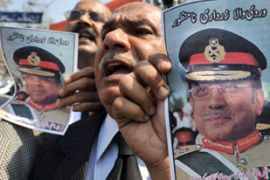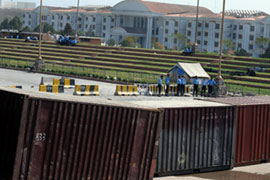Pakistan moves to stem turmoil
Government to appeal over court ban on Sharif brothers as protesters prepare to march.

The court ruling prompted Sharif to throw his weight behind the lawyers’ planned “Long March” protest against the refusal of Asif Ali Zardari, the president, to reinstate the senior supreme court judge.
Iftikar Chaudhry, the chief justice, was dismissed along with a number of other judges by Pervez Musharraf, the former president.
Long March
The dispute over Sharif’s position has highlighted the political turmoil in the country and the move appears to have come after Yusuf Raza Gilani, the prime minister, met Zardari in an attempt to find a resolution.
| In depth |
|
|
However, a spokesman for Sharif’s party dismissed the appeal as a political move aimed at diverting attention from the Long March.
“A review petition means nothing. The Long March will continue,” Iqbal Zafar Jhagra, the PML-N party general-secretary, told the Reuters news agency.
The government has been trying to stifle the impact of the protests which were expected to see hundreds of thousands of people flock to the capital.
Rehman Malik, the interior ministry chief, urged Pakistanis to stay away saying that “enemies of Pakistan could take advantage of the situation”.
“The Long March cannot be allowed on Constitution Avenue, but lawyers can hold their protest at any alternate venue outside Islamabad, so that life here is not disrupted,” he said.
Activists detained
Police have temporarily detained scores of activists across the country, including five people among hundreds of lawyers and Sharif supporters who defied a ban on demonstrations in the central city of Multan on Saturday.
 |
| Containers have been placed on Islamabad streets to stop the protesters [AFP] |
The authorities have blocked the main road leading to parliament with metal shipping containers. Demonstrators had hoped to stage a mass sit-in on Monday outside the building.
Major-General Athar Abbas, an army spokesman, said that the government had put the army on notice that an unspecified number of troops might be needed to protect “sensitive areas”.
Pakistan’s presidency also announced on Saturday that Zardari and Gilani had agreed to resolve the dispute over the judiciary “in accordance with the principles laid down in the charter of democracy”.
The document, which was signed by Zardari’s late wife, the assassinated former prime minister Benazir Bhutto, and Sharif in 2006, pledged to restore democracy, avoid confrontation and abolish the role of the military in politics.
Al Jazeera’s Imran Khan, reporting from Lahore, said: “Most analysts here will tell you … Zardari doesn’t want the chief justice reinstated because he feels he will reopen corruption cases against him.
“Nawaz Sharif, on the other hand, wants him to be reinstated because he feels that if he supports him he will overturn the ban.”
Minister resigns
The situation has also apparently led to the resignation of Sherry Rehman, Pakistan’s information minister.
Rehman, who had been an adviser to Zardari, reportedly stepped down after differences with other government officials over media restrictions during the crackdown ahead of the protests.
Pakistan’s The News reported that Rehman resigned “in protest” after she failed to convince Zardari to lift a ban on private Geo television.
The channel said its cable transmission had been blocked on Zardari’s orders because of its coverage of the protests.
Zardari’s office dismissed the claim.

 Video: Pakistan activists launch long march for justice
Video: Pakistan activists launch long march for justice